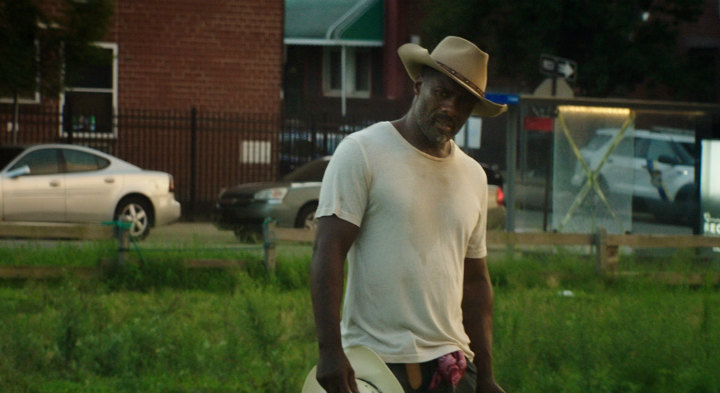Concrete Cowboy has a most interesting premise.
A classic coming-of-age drama set within the very real backdrop of Philadelphia cowboy culture, Concrete Cowboy also shines a spotlight on an ancient but often overlooked American subculture. Produced by Lee Daniels and directed by Ricky Staub making his first feature, Concrete Cowboy is a sturdy enough crowd pleaser that scored its world premiere at the Toronto International Film Festival.
After getting expelled from yet another Detroit school following yet another fight incident with his mates, restless teen, Cole (Stranger Things’ Caleb McLaughlin) is driven to North Philly by his exasperated single mother. She dumps Cole on the doorsteps of his mostly absent father, Harp (Idris Elba) for the summer, hoping that Harp would for once in his life, play his part in getting the troubled kid on the straight and narrow.
Concrete Cowboy is mostly concerned with how Cole and Harp begin to navigate the contours of their relationship. Staub, working from a screenplay which he adapts from the Greg Neri novel Ghetto Cowboy alongside Dan Walser traces the familiar beats that would ideally be present in films dealing with such father-son relationships.
Both Cole and Harp, initially hostile to the other begin to find reasons to relate as human beings. Both men are wounded and closed off, choosing to deal with their frustrations in separate ways. Harp adapts a hermit-like existence. Wizened by experience and the realities of being Black in America, he is emotionally closed off, finding kinship only in the stables and among the people who like himself gravitate to bonding with horses.
Cole on the other hand is a restless spirit. Sorely in need of a father figure in his life, he acts out recklessly, flirting with danger at every turn. This plays out once more when much to the disapproval of his father, he reconnects with an old friend, Smush (a solid, dependable Jharrel Jerome) who may or may not be up to no good.
As the gruff elder, Elba brings a certain gravitas to his barely-there role that presents a credible foundation for the more reactive McLaughlin to play off against. Part of the joy of Concrete Cowboy is watching both men portray their characters as they move from initial hostilities to mutual suspicion and then a grudging admiration of the other’s strengths.
However great the actors are- Staub mixes professionals including Lorraine Toussaint and Cliff “Method Man” Smith in supporting roles alongside real time Fletcher street cowboys- these beats have been highlighted repeatedly in other films. What makes Concrete Cowboy standout is how it takes a unique American subculture and drags it into the mainstream incorporating traditional film elements. Many who see the film will come to renewed realization of the contributions of black men and women to American inner-city equestrian culture.
Harp puts his reluctant son to work on the stables, teaching him in the process to value the virtues of hard work, mentorship, delayed gratification and investing in establishing relationships. There are also larger social concerns like gentrification, the illicit drug epidemic, homelessness and finding community and all of these speak eloquently to how the earlier highlighted values can present lifelines for troubled youth all over the world.
Staub’s filmmaking has its moments, especially in scenes involving the horses but for the most part, his polished, slick gaze sticks to traditional studio elements even while incorporating authentic characters. Staub’s film seems genuine enough though, boasting good intentions but with an on-the-nose approach. Black cowboys (and girls) may have been whitewashed out of the Hollywood canon in recent times, but Concrete Cowboy puts them right back.





Leave a reply